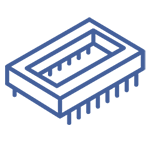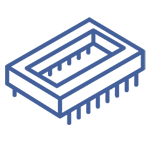

Delta Electronics DM03S4812A
Manufacturer No:
DM03S4812A
Tiny WHSLManufacturer:
Utmel No:
641-DM03S4812A
Package:
DIP-4
Description:
Isolated DC/DC Converters - Through Hole DC/DC Converter
Quantity:
Unit Price: $29.594634
Ext Price: $29.59
Delivery:





Payment:











In Stock : 10
Minimum: 1 Multiples: 1
Qty
Unit Price
Ext Price
1
$29.594634
$29.59
10
$27.919466
$279.19
100
$26.339119
$2,633.91
500
$24.848225
$12,424.11
1000
$23.441722
$23,441.72
Want a lower wholesale price? Please send RFQ, we will respond immediately.
RFQ Now
Add to RFQ list
You may place an order without registering to Utmel.
We strongly suggest you sign in before purchasing as you can track your order in real time.
For your convenience, we accept multiple payment methods in USD, including PayPal, Credit Card, and wire transfer.
RFQ (Request for Quotations)It is recommended to request for quotations to get the latest prices and inventories about the part.
Our sales will reply to your request by email within 24 hours.
1. You'll receive an order information email in your inbox. (Please remember to check the spam folder if you didn't hear from us).
2. Since inventories and prices may fluctuate to some extent, the sales manager is going to reconfirm the order and let you know if there are any updates.
- TypeParameter
- Factory Lead Time10 Weeks
- Package / Case
refers to the protective housing that encases an electronic component, providing mechanical support, electrical connections, and thermal management.
DIP-4 - Surface Mount
having leads that are designed to be soldered on the side of a circuit board that the body of the component is mounted on.
NO - Number of Terminals7
- RoHSDetails
- Mounting StylesThrough Hole
- Input Voltage-Min36 V
- Input Voltage-Max75 V
- Output Voltage-Channel 112 V
- Output Current-Channel 1250 mA
- Minimum Operating Temperature- 40 C
- Maximum Operating Temperature
the maximum body temperature at which the thermistor is designed to operate for extended periods of time with acceptable stability of its electrical characteristics.
+ 85 C - Factory Pack QuantityFactory Pack Quantity100
- Unit Weight0.571438 oz
- Package Description,
- Package StyleMICROELECTRONIC ASSEMBLY
- Package Body MaterialPLASTIC/EPOXY
- Operating Temperature-Min-40 °C
- Reflow Temperature-Max (s)NOT SPECIFIED
- Operating Temperature-Max70 °C
- Rohs CodeYes
- Manufacturer Part NumberDM03S4812A
- Load Regulation-Max1%
- Package ShapeRECTANGULAR
- Part Life Cycle CodeActive
- Ihs ManufacturerDELTA ELECTRONICS INC
- Output Voltage-Nom12 V
- Risk Rank5.71
- Series
In electronic components, the "Series" refers to a group of products that share similar characteristics, designs, or functionalities, often produced by the same manufacturer. These components within a series typically have common specifications but may vary in terms of voltage, power, or packaging to meet different application needs. The series name helps identify and differentiate between various product lines within a manufacturer's catalog.
DM03S - Packaging
Semiconductor package is a carrier / shell used to contain and cover one or more semiconductor components or integrated circuits. The material of the shell can be metal, plastic, glass or ceramic.
Tube - ECCN Code
An ECCN (Export Control Classification Number) is an alphanumeric code used by the U.S. Bureau of Industry and Security to identify and categorize electronic components and other dual-use items that may require an export license based on their technical characteristics and potential for military use.
EAR99 - Technology
In the context of electronic components, the parameter "Technology" refers to the specific manufacturing process and materials used to create the component. This includes the design, construction, and materials used in the production of the component. The technology used can greatly impact the performance, efficiency, and reliability of the electronic component. Different technologies may be used for different types of components, such as integrated circuits, resistors, capacitors, and more. Understanding the technology behind electronic components is important for selecting the right components for a particular application and ensuring optimal performance.
HYBRID - Terminal Position
In electronic components, the term "Terminal Position" refers to the physical location of the connection points on the component where external electrical connections can be made. These connection points, known as terminals, are typically used to attach wires, leads, or other components to the main body of the electronic component. The terminal position is important for ensuring proper connectivity and functionality of the component within a circuit. It is often specified in technical datasheets or component specifications to help designers and engineers understand how to properly integrate the component into their circuit designs.
DUAL - Terminal Form
Occurring at or forming the end of a series, succession, or the like; closing; concluding.
PIN/PEG - Peak Reflow Temperature (Cel)
Peak Reflow Temperature (Cel) is a parameter that specifies the maximum temperature at which an electronic component can be exposed during the reflow soldering process. Reflow soldering is a common method used to attach electronic components to a circuit board. The Peak Reflow Temperature is crucial because it ensures that the component is not damaged or degraded during the soldering process. Exceeding the specified Peak Reflow Temperature can lead to issues such as component failure, reduced performance, or even permanent damage to the component. It is important for manufacturers and assemblers to adhere to the recommended Peak Reflow Temperature to ensure the reliability and functionality of the electronic components.
NOT SPECIFIED - Number of Functions1
- Terminal Pitch
The center distance from one pole to the next.
2.54 mm - Reach Compliance Code
Reach Compliance Code refers to a designation indicating that electronic components meet the requirements set by the Registration, Evaluation, Authorization, and Restriction of Chemicals (REACH) regulation in the European Union. It signifies that the manufacturer has assessed and managed the chemical substances within the components to ensure safety and environmental protection. This code is vital for compliance with regulations aimed at minimizing risks associated with hazardous substances in electronic products.
compliant - JESD-30 Code
JESD-30 Code refers to a standardized descriptive designation system established by JEDEC for semiconductor-device packages. This system provides a systematic method for generating designators that convey essential information about the package's physical characteristics, such as size and shape, which aids in component identification and selection. By using JESD-30 codes, manufacturers and engineers can ensure consistency and clarity in the specification of semiconductor packages across various applications and industries.
R-PDMA-P7 - Number of Outputs1 Output
- Input Voltage-Nom
Input Voltage-Nom refers to the nominal or rated input voltage that an electronic component or device is designed to operate within. This parameter specifies the voltage level at which the component is expected to function optimally and safely. It is important to ensure that the actual input voltage supplied to the component does not exceed this nominal value to prevent damage or malfunction. Manufacturers provide this specification to guide users in selecting the appropriate power supply or input voltage source for the component. It is a critical parameter to consider when designing or using electronic circuits to ensure reliable performance and longevity of the component.
48 V - Temperature Grade
Temperature grades represent a tire's resistance to heat and its ability to dissipate heat when tested under controlled laboratory test conditions.
OTHER - Trim/Adjustable Output
Trim or adjustable output refers to the ability of an electronic component, such as a voltage regulator or power supply, to produce an output voltage that can be finely tuned or adjusted to meet specific requirements. This feature allows for precise control over the output voltage level, accommodating variations in load conditions or desired operational parameters. Users can typically achieve this adjustment through external resistors, potentiometers, or internal calibration mechanisms, ensuring optimal performance in diverse applications.
NO - Analog IC - Other Type
Analog IC - Other Type is a parameter used to categorize electronic components that are integrated circuits (ICs) designed for analog signal processing but do not fall into more specific subcategories such as amplifiers, comparators, or voltage regulators. These ICs may include specialized analog functions such as analog-to-digital converters (ADCs), digital-to-analog converters (DACs), voltage references, or signal conditioning circuits. They are typically used in various applications where precise analog signal processing is required, such as in audio equipment, instrumentation, communication systems, and industrial control systems. Manufacturers provide detailed specifications for these components to help engineers select the most suitable IC for their specific design requirements.
DC-DC REGULATED POWER SUPPLY MODULE - Output Power
That power available at a specified output of a device under specified conditions of operation.
3 W - Seated Height-Max
Seated Height-Max in electronic components refers to the maximum height at which a component can be comfortably installed or operated when a user is seated. It is particularly relevant in designs involving ergonomic considerations, where the placement of controls, displays, or other interfaces must accommodate users in seated positions. This parameter ensures accessibility and usability, preventing strain or discomfort during operation.
10.75 mm - Total Power Output-Max
Total Power Output-Max refers to the maximum amount of electrical power that an electronic component, such as an amplifier or power supply, can deliver to a load without risking damage or degradation of performance. This parameter is critical for ensuring that the component operates within its safe limits and performs efficiently under load conditions. Exceeding the Total Power Output-Max can lead to overheating, distortion, or component failure.
3 W - Output Voltage-Max
Output Voltage-Max is a parameter in electronic components that specifies the maximum voltage level that can be safely output by the component under normal operating conditions. This parameter is crucial for ensuring the proper functioning and longevity of the component, as exceeding the maximum output voltage can lead to damage or failure. Designers and engineers must carefully consider this specification when selecting components for a circuit to prevent overloading and potential hazards. It is important to adhere to the specified maximum output voltage to maintain the reliability and performance of the electronic system.
12.12 V - Output Voltage-Min
Output Voltage-Min is a parameter in electronic components that specifies the minimum voltage level that the component can provide at its output terminal under specified operating conditions. This parameter is crucial for determining the range of voltages that the component can deliver reliably to the connected circuit or device. It helps in ensuring that the output voltage remains within acceptable limits to prevent damage to the component or the connected components. Designers and engineers use this parameter to select components that meet the voltage requirements of their circuits and to ensure proper functionality and performance.
11.88 V - Product
In the context of electronic components, the parameter "Product" typically refers to the specific item or device being discussed or analyzed. It can refer to a physical electronic component such as a resistor, capacitor, transistor, or integrated circuit. The product parameter may also encompass more complex electronic devices like sensors, displays, microcontrollers, or communication modules.Understanding the product parameter is crucial in electronics as it helps identify the characteristics, specifications, and functionality of the component or device in question. This information is essential for selecting the right components for a circuit design, troubleshooting issues, or comparing different products for a particular application. Manufacturers often provide detailed product datasheets that outline key specifications, performance characteristics, and application guidelines to assist engineers and designers in utilizing the component effectively.
Isolated - Input Voltage
Input voltage is the voltage supplied to an electronic component or circuit for it to function properly. It is the driving force that enables the component to perform its intended tasks, such as amplifying signals or powering devices. The input voltage can vary depending on the design specifications of the component and its intended application. Exceeding the specified input voltage can lead to damage or failure of the component.
36 V to 75 V - Length31.8 mm
- Width20.3 mm
- Height10.5 mm























